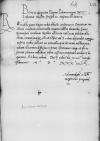List #1121
Bona Sforza do Ioannes DANTISCUSVilnius, 1534-02-18
| odebrano [1534]-03-11 Rękopiśmienne podstawy źródłowe:
Publikacje:
| ||||||
Tekst + aparat krytyczny + komentarzZwykły tekstTekst + komentarzTekst + aparat krytyczny
Reverendo in Christo paper damaged⌈[Reverendo in Christo]Reverendo in Christo paper damaged⌉ Patri, domino
Reverende in Chriso Pater, sincere nobis dilecte.
Misimus in ducatum nostrum
Et bene valeat.
Dat(ae) or Dat(um)⌈Dat(ae)Dat(ae) or Dat(um)⌉
Ad mandatum sacrae


 BCz, 3465, p. 236
BCz, 3465, p. 236